

As screens and devices increasingly permeate children’s lives, parents and health officials have justifiably begun to wonder about the psychological effects of extended screen time. Though the relationship between screen time and anxiety is worrying itself, many have questioned whether the presence of attention deficit hyperactivity disorder, or ADHD might compound the anxiety created in children by distracting devices. Here is what science has discovered thus far:
The human brain evolved without ever having to adapt to the dizzying array of devices and screens present in modern society. For this reason, science is still grappling with the long-term effects of screens on development. Doing so, however, has been difficult, as many different elements of modern devices are potentially problematic. Firstly, screens typically use bright, flickering LED or LCD lights to create visible images. These lights can stress the brain and the nervous system, resulting in eye fatigue and even headaches. The other major concerns brought about by device screens have to do with the content being displayed. Apps and social media sites are specifically engineered to be addictive and distracting. Naturally, this affects concentration.
Just as screens have multiple facets that influence the human mind, they can cause anxiety for a number of different reasons. These include, but are not limited to:
While screen time itself can cause anxiety, in some individuals, time spent away from screens can even amplify existing anxieties. Because anxiety often results in a feeling of impatience, worry, or hypervigilance, it is no surprise that research has linked anxiety and ADHD.
The link between ADHD and screens is not completely understood. While time spent using electronic devices does not appear to cause ADHD in older children, it can worsen it with every hour spent on devices. This can be worrying for parents and teachers who already struggle to hold children’s attention. So what can be done? While no single solution can solve ADHD, a combination of treatments is most likely to prove successful. Along with proper diet, exercise, sleep, and guided meditation, over the counter medication can reduce device-related anxiety. Brillia for ADHD and anxiety is formulated to help children concentrate and deal successfully with stressors.
Because habits developed in childhood are the most likely to remain throughout one’s life, you should always monitor your children’s screen use carefully. While healthy lifestyle practices are excellent for a child’s overall wellbeing, they should not be used to excuse unlimited screen time in young children.
As with everything in life, moderation is key. Screens are here to stay, but they don’t have to overwhelm your child. Information online, including Brillia ADHD reviews contain information on over the counter ADHD medication. If you are concerned about your child’s screen habits, try to look at the full picture of your child’s behavior. By addressing deficits in sleep, mental hygiene, and supplementation, you can give your child the best possible start in life.
The year 2020 and the pandemic threw a wrench into everyone's plans. Companies that were…
AI is successful in boosting the productivity of organizations while helping them save cost and…
Suppose you battle back discomfort or other associated ailments due to sitting for lengthy periods…
In November 2023, investor Maksym Krippa acquired the Parus Business Center, redefining the commercial real…
Programmers create computer programs, mobile solutions and also analyse the needs of their clients and…
A trip to Santiago is sure to be memorable by default as simply seeing this…